#fandom is egalitarian and communal to me so anything kubo says doesn't get special treatment from me
Explore tagged Tumblr posts
Note

For @canariie! <3
I hope this isn’t read with any aggression or antipathy toward Kubo or Klub or anything else, because I have neither aggression nor antipathy about this. This response is going to be a long way of saying “Kubo doesn’t matter to me, so I often ignore him,” but I feel like that requires a disclaimer and some additional explanation or else I feel like it comes across as embittered and rage-y and I promise it’s neither. I am extremely neutral about this, I have a pH of 7 about this. XDDD
But my approach to fandom and fannish stuff is like... in “real life” you have to pay attention to and care about basically everything, even if you think it is silly and not worth the time. But if something is a hobby and for fun, then you’re under no such obligation. Given that free time is at an extreme premium, I try not to spend it on things that aren’t interesting to me. This goes for wank and shipwars and whatever, sure; but it also applies to pieces of canon that aren’t interesting to me, and it includes authorial paratexts like Kubo’s Klub thing. Because do I feel any particular reverence for things Kubo says? No, I do not. XD I think about Kubo, in any capacity, vanishingly little.
And where new paratexts are concerned, my view is that once a work has been published, it’s entered the afterlife of its text (citation: the ghost of Walter Benjamin). Particularly in a fannish space, it’s in the hands of its readers as much as its writer, and it is going to become a thousand things as it is translated through this community of readers (and in our case, literal translations too). Kubo’s paratexts aren’t by default any more important to me than someone else’s headcanons (and I say this with SO MUCH LOVE for many of Kubo’s paratexts, like Colorful Bleach! and a lot of love for the “non-canon,” like the anime filler arcs). In my thinking, I’m going to privilege whichever ones I find most interesting.
Kubo says in a locked forum that Hitsugaya is older than Hinamori? That’s not interesting to me. Slush pile-->Ignore. (For that matter, “Hitsugaya had bankai before entering Academy” or whatever the other one was? Deeply uninteresting to me. Slush pile-->Ignore.)
If, for fanfic purposes or something, I felt I had no choice but to bring Klub into the discussion, I’d probably just go the “Hitsugaya had been in Rukongai longer, growing up in slow long Rukongai time, and then Hinamori came over after him,” which I think is a fairly typical interpretation. But the Klub response itself, to me, manages to both foreclose interesting narratives while introducing ones that I find less interesting, so I primarily just ignore it.
*Your* thoughts (and this nonfictional environmental book), however, I am VERY INTERESTED IN AND VERY MUCH WANT TO READ. I am so looking forward to your post!!!
For the anniversary ask: how do you think the aging of Shinigami works?
@jiyle asked a variation of the same, so I will count this answer for both!
As you both know, there are lots of different shinigami aging theories out there, which I think is fabulous. Here’s mine!
I. BIOLOGY
How does shinigami aging work? My first impulse was not to try too hard to analogize it to human aging. I mean, how old is Lightning McQueen in human years? He’s a car, so why not just imagine him in car years? As someone who owns a car that is the same age as the cinematic masterpiece, Pixar's Cars, "16-year old car" carries a lot of meaning that is untranslatable to an approximate human age.
But maybe shinigami aging is more similar to human aging than it first appears. Sure, shinigami aging is wacky and non-linear, but so is human aging. Human aging sees periods of rapid development, and also periods of (seeming) stasis. Aging approximates different mathematical functions at different points in a person’s life.
Generally speaking, that seems to describe what we see of shinigami aging pretty decently, too. It seems like the three main distinctions between shinigami and human aging are:
Shinigami live longer lol.
Shinigami periods of development and stasis are more pronounced. Rather than just having their aging streeeeetched to fit the length of their lifespan, their periods of development are more acute/extreme.
Human aging is more readily generalizable to a population, whereas shinigami seem more variable. We have the Academy Kids + Hitsugaya more or less getting older at some kind of regular interval, even if maybe they are not quite exactly the same interval. But we also have Unohana. And Shinji, for that matter, lopsided man of mystery.
As for more specifics? Meh. People in Seireitei probably age differently than those in Rukongai. Shinigami probably age differently than non-shinigami souls. (Which I imagine could make for some interesting family dynamics!) The reiryoku you possess probably plays a role here, and perhaps even its expression as reiatsu plays a separate one. I think there are a lot of variables to play with here and I take a plot of pleasure in that. To add to the variables, I’m frankly not convinced that time is even linear in Soul Society, nor am I convinced that time (and space) are uniform ACROSS Soul Society.
One last thought to close this section: If we want to imagine the biological age of a shinigami, particularly a Captain-class shinigami, what analogy is most appropriate? Do we analogize age in terms of humanity? That thing shinigami echo/ghost? Or is it more appropriate to imagine their life milestones like those of a star, a ball of incredible and otherworldly energy?
The Hell Arc seems to strongly imply that the Gotei did not think about this. Or at least, possibly not enough.
--
Below the cut: Shinigami theories of development, age as an identity category and its relative importance (or lack thereof), and how human interaction might impact these ideas.
--
II. CULTURE
Because their biological age is harder to meaningfully quantify, I feel like it’s probably even less important, culturally, to shinigami than it is to us. As age approaches infinity, what is one millennium, or two? Things like your class/rank/reiatsu classification seem like they would be infinitely more relevant for anyone trying to figure out who you are, or how to interact with you. (Imagine GoteiMingle… instead of A/S/L you give your rank/gender/division. What a miserable little website, LOL.)
I think it’s also worth thinking about what Soul Society’s conceptions of these different, less culturally relevant life stages would be, since for humans, the concept of "childhood" (what it is, what ages it covers, why it matters) is already historically variable. Soul Society does seem to mostly acknowledge that children are different than adults, so there’s that. (Maybe because of the preponderance of ghost children they deal with?). Yoruichi understands Byakuya as an adolescent in TBTP, and Kyouraku and Ukitake express similar sensibilities in the Beast Swords arc.
But it also seems like Soi Fon is Yoruichi’s vassal before she’s understood is a child, and I imagine Byakuya is family head-in-training before he is a child, too.
This is an oversimplification, but in the Edo period, childhood/adulthood were understood as particular social stages demarcated by coming-of-age ceremonies. These did roughly align with biological age, though children transitioned into "adulthood" somewhere between ages 13 and 20 (in the scheme of things, a pretty broad range). As a child, you got to play and socialize. But you were also already understood to be in-training to become a samurai, or a merchant, or a priest, or family head, or marriageable, or whatever; and then you became that thing. You weren’t an adult because you turned 18, or 20, but because you acquired the ability to do adult work. (And/or your paranoid family really needed you, at age 3, to be family head, LOL. But let’s ignore those cases.)
This seems to track with Soul Society’s sensibilities, in the sense that shinigami adulthood would be less about your biological age than about having completed training (e.g. Academy). I’m not saying that this is how you *should* see things; I just think it’s likely that this is how they do. In a world where rank and/or class supersedes all, and adulthood is defined as the ability to do adult work, if you’re employed then you’re an adult.
Like, I don’t think shinigami by and large see Hitsugaya as a child. We don't generally tend to see his authority questioned (at least in formal situations; antics happen in a different register). He probably did intentional work for this, yeah, but it’s not as though his youth were this insurmountable obstacle to achieving respect as a captain. I feel like most shinigami probably don’t go around thinking "what is this child doing here"; and moreover, they also probably don’t even think, even in a neutral way, "that one is a child." He's a captain.
Ironically, the two people who don’t ever seem to get on board with this* are Ichigo and Aizen, with Ichigo calling him "Toushirou" and Aizen calling him "Hitsugaya-kun" (both when they are celebrating birthdays AND when Aizen is repainting the Council of 46 chambers with fresh blood). Because, well, Aizen is an asshole, and Ichigo is on his own planet and has clear ideas about how that planet works, LOL. Which is fine because it’s a great planet.
And I think all of this can be true without having to be completely blind to Hitsugaya’s biological age, whatever it may be. He knows he’s young, and tends to be upfront about that as long as that’s not taken to be synonymous with not being an adult.
In Chapter 80 Renji refers to him as 例の天才児 (rei no tensaiji), or "the model child prodigy." Mildly derisive, but I’m pretty sure it’s the "model" part rather than the "child" part that Renji finds annoying. (Though the Viz omits both of these, so perhaps they had a different opinion, XD.)
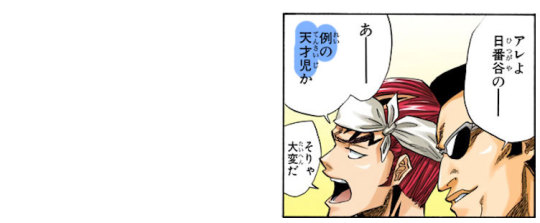
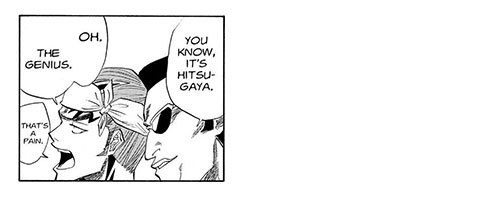
In Chapter 208, Shawlong Qufong also describes Hitsugaya as 幼い (osanai), "young," in the sense of not being fully-developed, which he links grammatically to a description of Hitsugaya’s bankai. I think it’s intended more a statement of fact than it is an insult—osanai doesn’t have an inherently negative connotation, though maybe it’s worth mentioning that it appears to evoke the idea of literal babies more than say, a young man or even a young boy.
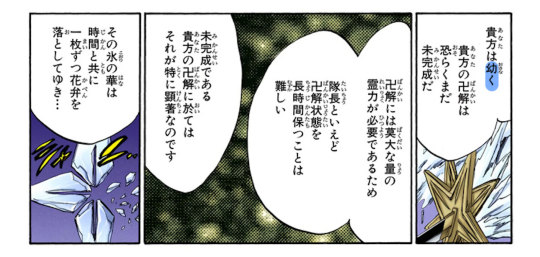
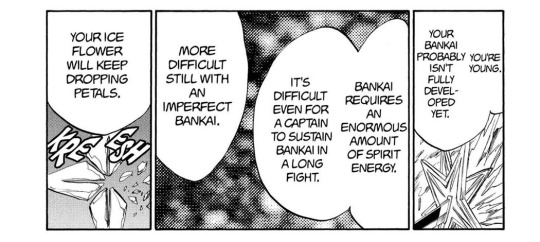
AND SURE, what does Shawlong know about shinigami. What does Shawlong know about anything? But I think we can throw Shawlong a bone and take this to mean that Hitsugaya’s biological age is unambiguously young. But in spite of this, it may not be functionally relevant or "read" socially in shinigami day-to-day.
* NB: Hinamori is in her own category!! And omake Ukitake, who I'll reference later. There’s also the bathhouse lady from Shinigami Cup 74, who reads Hitsugaya as a child in spite of the fact that they are in the Seireitei (I assume—how far would Hitsugaya have agreed to walk with all their paperwork in hand??) and he is literally wearing his Captain’s haori. I think about her all the time. She keeps me up at night.
III. HUMANITY
This isn’t to say that referencing someone’s youth can’t be done derogatorily. Byakuya shouts at Ichigo during their big pre-execution fight, and called him 小僧 (kozou), "boy." Which I mean, Ichigo is literally… 15… And Byakuya is what, more than 10x that?
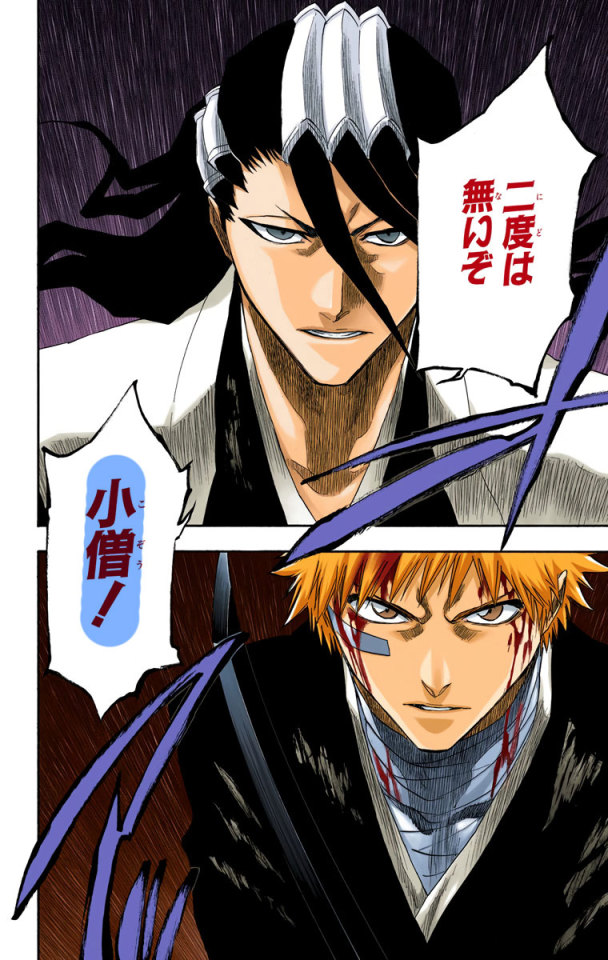
More to the point, I think it’s really interesting to think about how shinigami specifically think about human age, too. All humans are younger than anyone in the main cast, and the Karakura Kids are BABIES. But they are also human adolescents, on the cusp of childhood and adulthood at once, and I imagine that’s often baffling and/or fascinating to the shinigami. I mean, I think Ichigo is baffling to Soul Society for a lot of reasons, LOL, but this would be another one for the bingo card.
Additionally, during the Edo period, the concept of adolescence as a "thing" was kind of on-again, off-again, and inasmuch as we can play with Soul Society’s Edo references that one seems fun to me, in terms of whether or not a shinigami believes that there’s anything between childhood and adulthood. Especially when you think about what the modern vs. Edo expectations of different biological ages and their relationship to adulthood might be. And ESPECIALLY ESPECIALLY when you think about the ways those differences are countered by the fact that they are living a manga series, and fifteen-year olds in manga series are a whole other Thing. I mean, even in the most slice-of-life corner of Bleach, half of Ichigo’s friends are living independently at 15!
I’m also interested in shifting ideas of childhood in Soul Society as a result of ongoing contact with the human world. Being a shinigami is by and large defined by services rendered. It’s in the name! And if you’re not doing that, then what are you doing. But if you’re an "adult" after six measly years of Academy, potentially for thousands of years, and being an adult is defined by doing work, I imagine it’s difficult to remember what childhood even is, or what forms of play/pleasure/curiosity were part of it (and perhaps should still be cultivated, even on the other side of the divide). I know they have clubs and whatnot, but I don’t think that means this difficulty does not exist. Does contact with the human world help? (Or do they just end up ferrying a bunch of extremely sad overworked salarymen ghosts across like, "That’s rough, buddy.")
Did the development of children’s literature as a form inspire Ukitake’s "Sougyo’s Refusal!" serialization? What about his (somewhat haphazard) gifts of candy? The fact that he actually knows everyone’s birthdays and puts them into the SC? Is this the way Ukitake, as a thousanty-something year-old shinigami, courts modernity?
#bleach headcanons#no brain just bleach#this is my magpie approach to fandom#maybe the thing i'm not interested in is the idea that kubo paratexts can godmod lolol#fandom is egalitarian and communal to me so anything kubo says doesn't get special treatment from me#you hit print on that text baybeee and you handed it to us#now we're all in this soup together
89 notes
·
View notes